
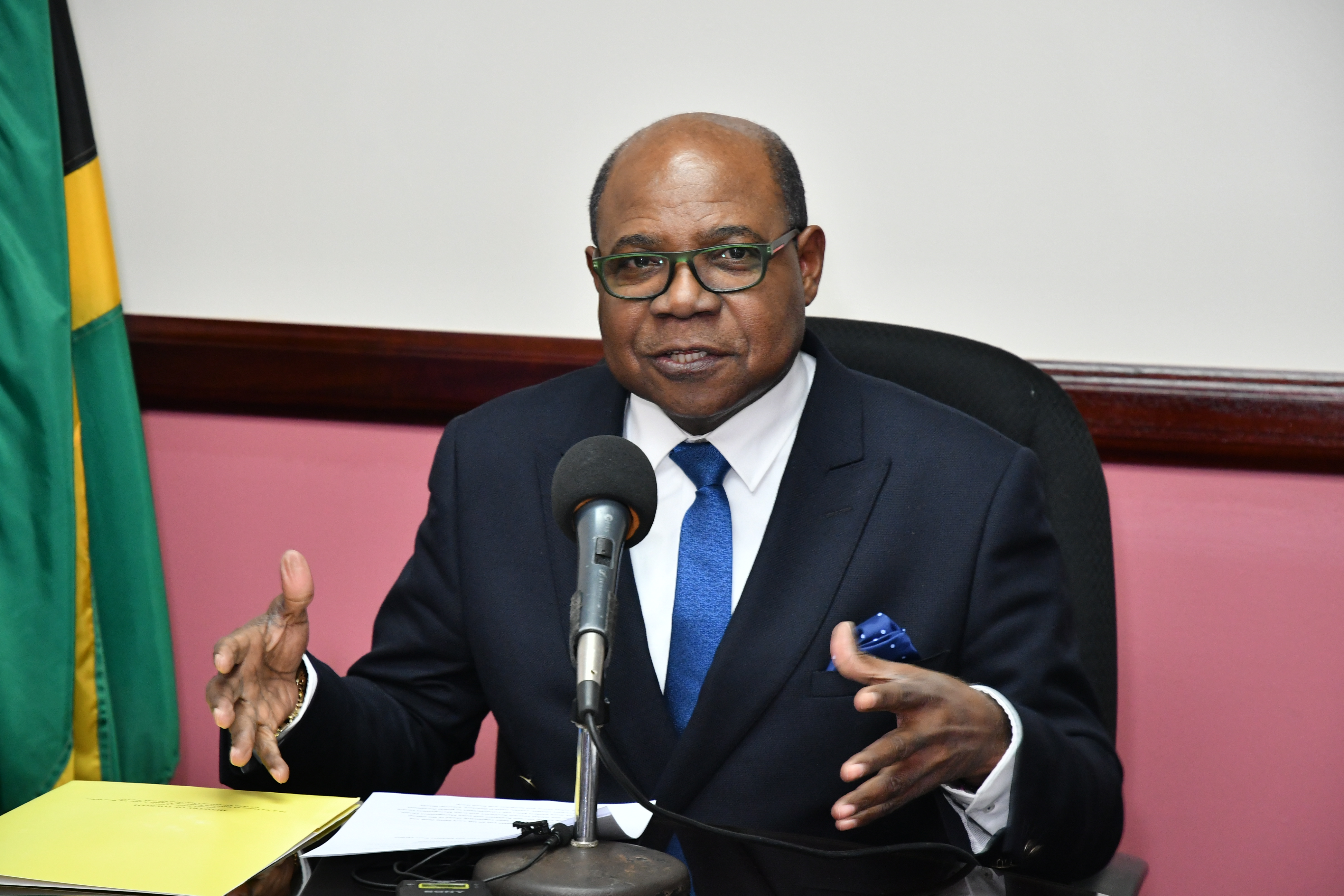
Major Global Entities Show Support for Global Tourism Resilience and Crisis Management Centre
Tourism Minister Hon, Edmund Bartlett says the Global Tourism Resilience and Crisis Management Centre is becoming the most significant global institution in the world, in relation to resilience and crisis management issues, as it has received support from a large number of states and major tourism entities across the world.
Speaking at a press conference at the Ministry of Tourism’s New Kingston Office yesterday (November 29), the Minister noted, “Already, we have a large number of groups that will collaborate with the Centre and help it to start operating on a global basis, even before our launch in January. Some of these partners include the International Institution for Investment in Tourism, the Pacific Asia Travel Association and the Mediterranean Tourism Foundation.”
He went on to note that, “Out of Europe, we have the Global Resilience Council, the United Nations World Tourism Organization, The World Travel & Tourism Council and the Caribbean Hotel & Tourism Association that that has now partnered with us. All these are critical global tourism constructs which have now become part of this entity. Before the Centre gets off the ground properly, it is hugely resourced from across the world,” said Minister Bartlett.
Also joining the leadership of the Centre is Haitham Mattar, Chief Executive Director of the Ras Al Khaimah Tourism Development Authority of the United Arab Emirates (UAE), who has been appointed regional coordinator for the Middle East and will provide technical support.
“Following a successful meeting in Washington DC, I can also share that the Inter-American Development Bank (IDB) has given a full endorsement and commitment to participate with resources. In fact, the country leader for IDB will come to Jamaica in week and a half, to view the site and determine what needs to be done,” said the Minister.
Prime Minister, the Most Hon Andrew Holness and Her Excellency Marie-Louise Coleiro Preca, President of Malta, will also act as honorary chairs to the Global Tourism Resilience and Crisis Management Centre.
“Our board members include some of the leading players in the industry; form every continent, except Oceania. But, we are expected to get Australia on board through the Queensland University connection currently being negotiated in time for the launch,” said the Minister.
The Centre, which will be housed at the University of the West Indies, Mona, is being designed to help vulnerable states across the world, to recover quickly from natural disasters. It will specifically target destination preparedness, management and recovery from disruptions and/or crises that threaten economies and livelihoods globally, with real time data and effective communication.
The Centre will also house a Sustainable Tourism Observatory which will assist with preparedness, management and recovery from disruptions. It will also support policymakers and businesses develop better strategies to support a more competitive global tourism sector.
The official launch of the Global Tourism Resilience and Crisis Management Centre is scheduled for January 2019, during the Caribbean Travel Marketplace, which will be held at the Montego Bay Convention Centre.
“The leaders of a number of global tourism entities as well as leaders of a number of small countries that are vulnerable, will come to Jamaica for the official launch of this Centre,” said the Minister.
It will specifically be tasked with creating, producing and generating toolkits, guidelines and policies to assist with preparatory and recovery efforts of tourism stakeholders affected by climatic, pandemic, cyber-crime and cyber-terrorism related disruptions.
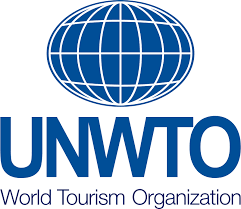
UNWTO: 2018 poised to advance tourism’s leadership among top economic sectors
The latest figures on world tourism issued by the World Tourism Organization (UNWTO) show that international tourist arrivals grew 5% year-on-year in the first nine months of 2018. This reflects continued strong demand in a favorable overall economic context.
All world regions enjoyed robust growth in international tourism in the first nine months of this year, fuelled by solid demand from major source markets. Asia and the Pacific led growth (+7%), followed by Europe and the Middle East (+6% each), Africa (+5%) and the Americas (+3%).
Despite comparatively slower growth between July and September, UNWTO estimates that destinations worldwide received 1,083 million international arrivals through September, an additional 56 million when compared to the same period of 2017.
2018 results to date are in line with UNWTO’s growth forecast of +4% to +5% for the year. The first nine months of the year usually account for about three quarters of total annual international arrivals, as they include the Northern Hemisphere high season months of July and August.
Positive growth in tourism earnings across most destinations
With few exceptions, preliminary data on international tourism receipts confirm the positive trend seen in arrivals, with particularly strong results in Asian and European destinations.
Among the top earners, tourism earnings in the United Kingdom were up by 12% despite a decline in arrivals. In Australia, receipts increased by 11% whereas France reported an 8% growth and Italy 6%, both in line with growth in arrivals. Tourism receipts in the United States, Spain and Germany went up 3%.
In Asia, China recorded a 21% increase in tourism earnings, with Macao (China) and Japan also leading results with 20% and 19% growth, respectively.
International tourism expenditure
Preliminary data on tourism spending for the first nine months of 2018 reflect increasing demand from major source markets.
The Russian Federation (+15%) reported the largest increase in spending and continues to recover strongly after some years of decline. The United Kingdom reported 10% growth despite a weak pound against the euro and US dollar, and tourism spending from France picked up 10% after some years of rather flat growth.
The United States, the world’s second largest source market, recorded a 7% increase in line with the performance of recent years while top source market China showed a minor decrease in spending in the first six months of 2018 as a result of the weaker Yuan.
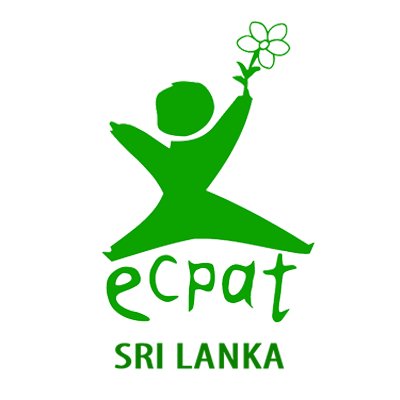
Geneva: Tourism sector meets to tackle human rights issues in the industry
Representatives of the travel and tourism industry are meeting at the UN in Geneva today to discuss the global action needed to end human trafficking, forced labour and the sexual exploitation of children within the sector.
Co-organized by ECPAT and the International Tourism Partnership, the United Nations Forum on Business and Human Rights, will be the first time the sector has gathered to discuss possible solutions to these shared challenges before a United Nations audience.
The travel and tourism industry has rapidly expanded in recent years, with international tourist arrivals increasing from 528 million in 2005 to 1,323 million in 2017. Many developed countries that were once considered “remote” have now opened up to international visitors. However, this expansion has brought challenges to human rights, with the trafficking and sexual exploitation of children increasing alongside the industry’s expansion. No country is immune to this ever-growing risk. However, the industry is also in a unique position to identify the most vulnerable – and to prevent these breaches of human rights.
The industry has a role
“As the reach of global tourism expands, so too do opportunities for those who travel to harm children by sexually exploiting them,” said Theo Noten, Programme Manager, ECPAT Netherlands. “The travel and tourism industry has a key role to play in keeping children safe. Together with business leaders, especially from the travel industry, we call upon the private sector and governments to protect children and meet the commitments made to achieve the Sustainable Development Goals. No child should be left behind!”
Commitment to ending these crimes
At the meeting, experts from non-profit organizations will stand shoulder to shoulder with senior leaders from global travel and tourism companies, such as IATA, the Hilton group and TUI. They will commit to tackling these crimes, which cause misery to millions around the world and in the long-term have a direct impact on the tourism industry.
Speaking before the event, Madhu Rajesh, Director of the International Tourism Partnership explained how her organization is working to help protect human rights in the industry. “ITP convenes the world’s leading hotel groups for collaborative action on these critical human rights issues,” she said. “And in doing so we create practical tools and programmes that help the hotel industry as a whole move further and faster than they can working individually. For example, we’ve united our membership around support for ITP’s Principles on Forced Labour, and encourage their adoption by the wider industry. Through our work, we aim to convene key stakeholders from the public and private sector and encourage cross-sector collaboration on this vital issue.”
End modern slavery
Helen Taylor, Director of Grant Programs at the Global Fund to End Modern Slavery added: “GFEMS is committed to ending modern slavery by making it economically unprofitable, and businesses must play a prominent role if we hope to achieve that mission. We’re pleased to see global tourism business leaders joining forces to work towards our shared goal of fighting human trafficking and hope this forum will motivate other companies to get involved in driving solutions forward as well.”
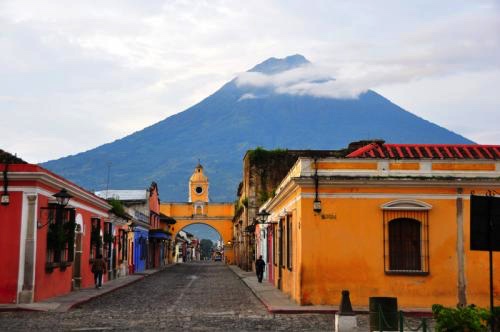
UNWTO features as tourism enters Ibero-American cooperation agenda
The 26th Ibero-American Summit of Heads of State and Government (La Antigua, Guatemala, 15-16 November) concluded with a high-level political declaration on sustainable development in which tourism plays a key supporting role. The commitment, which includes the World Tourism Organization (UNWTO), marks the first time the tourism sector has been featured in a top-level multilateral cooperation agenda.
Ibero-American presidents and heads of state have mandated the Ibero-American General Secretariat (SEGIB) with introducing tourism in the development cooperation portfolio of its 22 member states, all of which are also UNWTO Member States.
In the ‘La Antigua Action Program for Ibero-American Cooperation’, the mandate from heads of state and government specifically calls on SEGIB to closely coordinate its future work around tourism with UNWTO. Both organizations are asked to collaborate on initiatives to promote sustainable tourism that can impact on development, partnering with key actors of the United Nations’ 2030 Agenda for Sustainable Development.
This accord is unprecedented for its inclusion of tourism in an international multilateral action plan for cooperation. The commitment includes tourism and the economy together as one issue area, urging states to prioritize public policies for developing and managing sustainable and responsible tourism to boost competitiveness.
A first contribution of UNWTO has been the publication “The Contribution of Tourism to the Sustainable Development Goals in Ibero-America”, produced on the occasion of the First Ibero-American Conference of Ministers of Economy and Tourism held in September, and leading up to Summit of Presidents and Heads of State.
This advance has the potential to give tourism a deservedly strong voice at the highest political and policy levels, adding value to economies and complementing UNWTO’s work with its members and partners across and beyond Ibero-American states.

He is WTTC’s “Travel & Tourism job creation Champion”
Speaking today at the inaugural WTTC Africa Leaders Forum in Stellenbosch, South Africa, which was hosted by Tourism South Africa, Guevara said: “In his State of the Nation address in February this year, President Ramaphosa not only mentioned the “incredible opportunities” of Travel & Tourism, he also set a powerful target to double the number of people directly employed in our sector from 700,000 to 1.4 million.
President Ramaphosa of South Africa is a “Travel & Tourism job creation champion” for his ambition to double the number of people employed in the sector, according to Gloria Guevara, President & CEO of the World Travel & Tourism Council (WTTC).
“Travel & Tourism is without doubt South Africa’s greatest engine for the creation of jobs and the alleviation of poverty. It contributes to social equality, encourages the integration of women in the workplace, and enables economic self-reliance. It provides employment in parts of the country where other jobs may not exist and generates a sense of self-worth. We praise the Government for recognising those “incredible opportunities” of our sector and the steps it has already taken to realise the potential.
“We see those opportunities falling in three broad areas: We congratulate the Government of President Ramaphosa for its efforts to reform the visa process so that more tourists from more countries can visit the country and recommend that this is rolled-out as widely as possible. Secondly, we support the long-held ambition to fully liberalise the continent’s air services. Finally, we see the benefits of South Africa’s continued adoption of biometrics as a way to make travel safer and more efficient.
“These and other initiatives will help to achieve President Ramaphosa’s ambitions and we look forward to continuing our strong partnership with his Minister of Tourism, His Excellency Derek Hanekom,” concluded Guevara.
According to annually published WTTC data, Travel & Tourism currently contributes a total of 8.9% of South Africa’s GDP and creates 726,000 jobs directly, rising to 1.5 million when all the impacts of the sector are taken into account.
WTTC represents the global Travel & Tourism private sector. Its Members consist of more than 170 Chairs, Presidents and CEOs from companies in every part of the Travel & Tourism sector.
Given the potential of Travel & Tourism in Africa, WTTC gathered the CEOs and regional leaders of the top Travel & Tourism companies from across Africa, along with Tourism Ministers and regional experts at its inaugural Africa Leaders Forum in Stellenbosch to discuss the key issues facing the region’s Travel & Tourism sector. WTTC would like to thank the South Africa Ministry of Tourism for its hospitality in helping to bring the sector together to facilitate the dialogue.
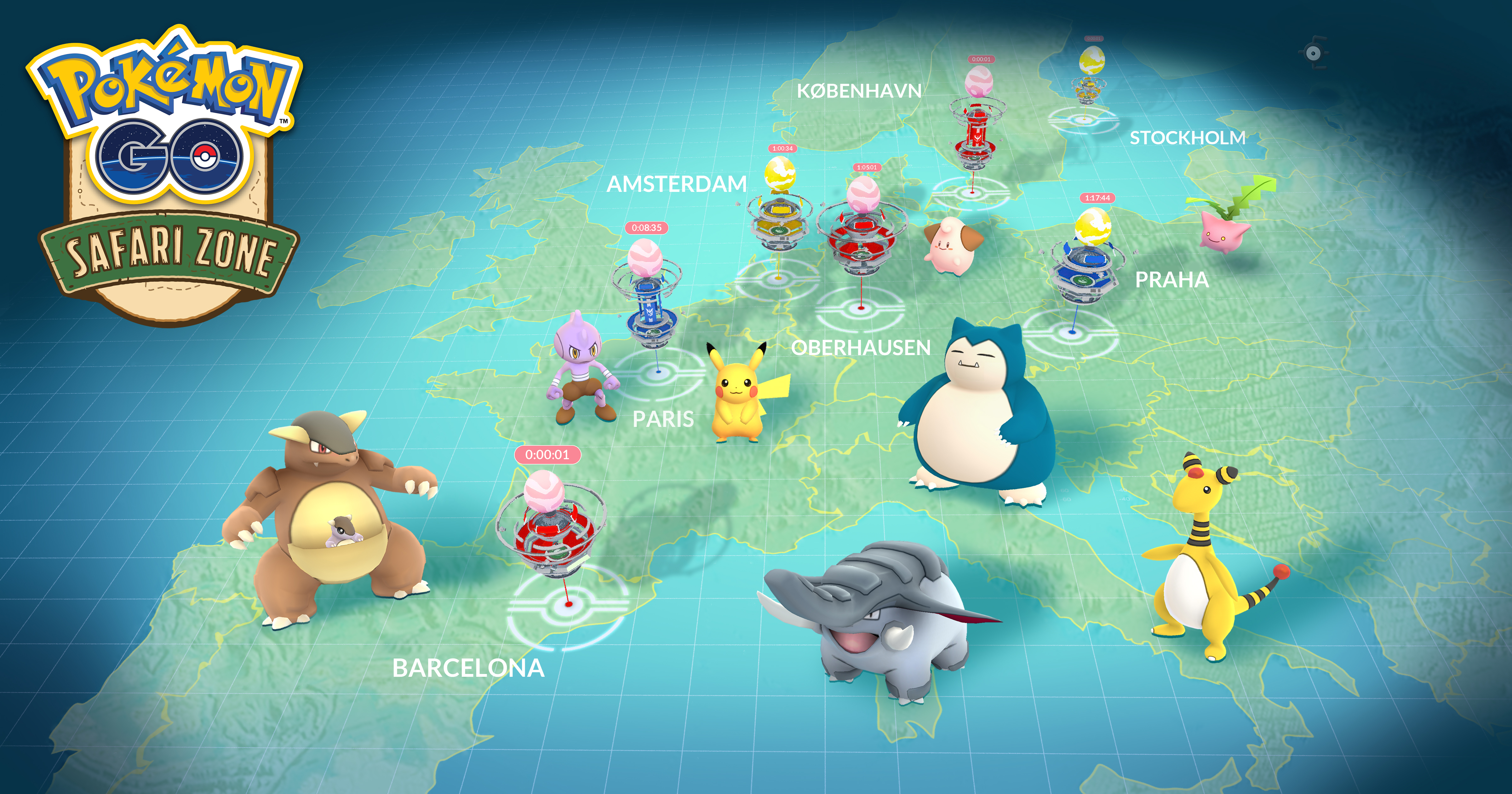
What does World Tourism have in common with Pokemon Go?
The World Tourism Organization (UNWTO) has partnered with one of its newest Affiliate Members, real-world games developer Niantic, to enhance global tourism through the use of mobile augmented reality game experiences.
UNWTO will collaborate with Niantic, creators of Pokémon GO and Ingress Prime, to curate unique campaigns around the world that will build awareness for the Organization’s Travel.Enjoy.Respect campaign, designed to enhance tourism’s contribution to the United Nations’ 2030 Agenda for Sustainable Development. Each activity will also be designed to inspire and support exploration, and promote safe and responsible gaming practices for players of all ages.
Niantic and UNWTO will work together to combine tourism and Augmented Reality technology for players to engage with real-world locations using Niantic’s mobile games in a variety of ways. Niantic’s games and global initiatives have brought millions of players from around the world together at real-world events that promote civic engagement and cultural diversity while highlighting local heritage.
“With our ongoing commitment to promote sustainable and responsible tourism, and Niantic having recently become a UNWTO Affiliate Member, this partnership is a natural fit,” said Ion Vilcu, Director of UNWTO’s Affiliate Members Department. “Niantic are pioneers in creating real-world mobile game experiences that not only motivate their players to discover new places, but also to appreciate the culture and beauty of the world around them,” he added.
“Our goal at Niantic is to create interactive games that encourage exercise, social interaction and exploration, giving players the opportunity to play together in the real world and discover the incredible history hidden in their own neighbourhoods,” said Anne Beuttenmüller, Head of Marketing EMEA at Niantic. “We’re looking forward to creating brand new adventures in collaboration with UNWTO to increase awareness around their mission of responsible tourism,” she added.
Niantic was accepted as an Affiliate Member on 31 October 2018 at the 109th session of UNWTO’s Executive Council, held in Manama, Bahrain. This new partnership helps to bolster UNWTO’s ongoing efforts to bring together the actors of the ‘ecosystem’ of tourism technology under its priority of innovation and the digital transformation in tourism.
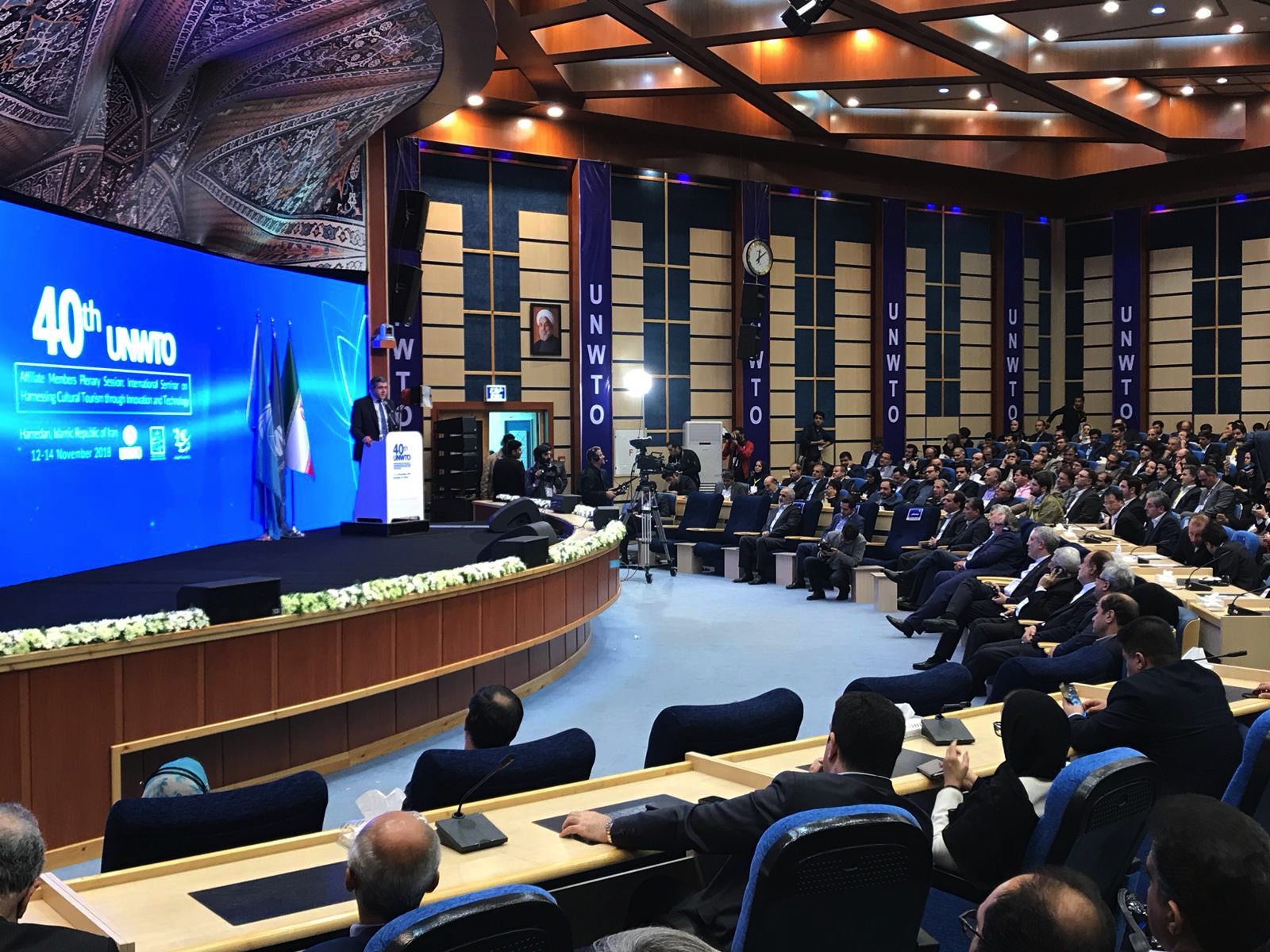
UNWTO: Community involvement needed in cultural tourism’s digital transformation
The World Tourism Organization (UNWTO)’s International Seminar on Harnessing Cultural Tourism through Innovation and Technology and 40th Affiliate Members Plenary Session concluded with a renewed call for community participation in development of cultural tourism using cutting-edge technologies (12-14 November 2018, Hamedan, Islamic Republic of Iran).
Cultural and heritage attractions are key to tourism development in many countries around the world, and innovation and technology can make these attractions more accessible while preserving their essence, the seminar concluded. It also stressed that innovation and technology should empower, rather than disenfranchise, host populations and communities and can assist them in retaining their authenticity, while cultural heritage development and preservation should be a part of local and national plans for socioeconomic development through tourism and technology.
“Technology and innovation, including ICT, can improve the quality of the tourist experience. It can improve governance, profits and the wellbeing of residents. And it can preserve intangible and tangible heritage resources for the sustainable development of cultural tourism,” said UNWTO Secretary-General Zurab Pololikashvili opening the event.
“The world’s diverse range of culture and heritage form the best means and ways to connect peoples of the world – but only if the rights and privileges of both host and guest populations are respected and responded to. And innovation and technology can help”, added Iranian Vice-President Ali Asghar Mounesan, who also heads the Iran Cultural Heritage, Handcraft and Tourism Organization (ICHTO).
The seminar agreed that informed governance and policies surrounding uptake of new technologies and innovative practices can guide tourism development and open doors for the sector, with conservation and revitalization of cultural heritage one of its main benefits. It also highlighted that for tourism authorities, participation of, and collaboration with, the host community should be a driver for technology-driven change. It was urged that tourism development not only maximize benefits and minimize costs for greater competitiveness, but also respond to the expectations and needs of hosts and guests alike.
The seminar was organized by UNWTO, ICHTO and Alisadr Tourism Company. Alongside it, Hamedan played host to the UNWTO Affiliate Members’ 40th plenary, in which active discussions were held as UNWTO’s Affiliate Members voiced their opinions and suggestions on the Affiliate Members Department’s Programme of Work for 2019.
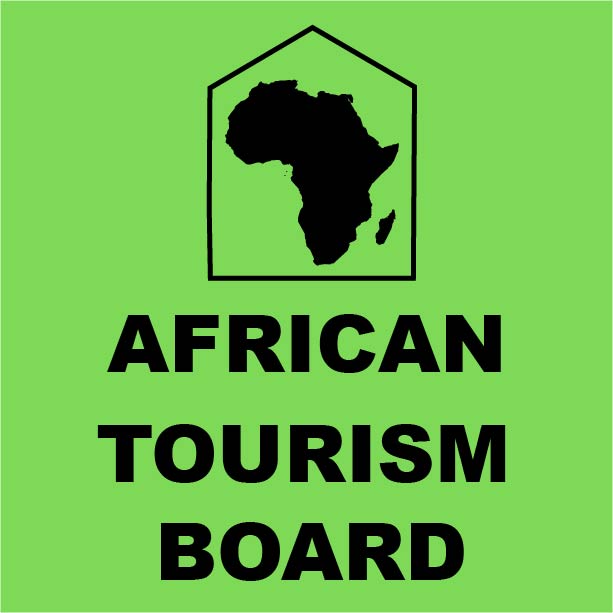
Bartlett Appointed to African Tourism Board
KINGSTON, Jamaica; November 12, 2018: Tourism Minister, Hon. Edmund Bartlett has been appointed to the board of sitting ministers and appointed public officials, of the newly formed African Tourism Board association.
Bartlett received the appointment while in London, last week, during the official unveiling of the multinational-body at this year’s World Travel Market. The organization, which is part of the International Coalition of Tourism Partners, was developed to promote the hospitality sector in Africa.
Other members include Hon. Jose Gonçalves, Cape Verde’s Minister of Tourism; Hon. Minister Mahmoud Kombo, Zanzibar’s Minister Information, Tourism and Heritage; Pascal Viroleau, CEO The Vanilla Islands Organisation; and Hon Dr. Memunatu Pratt, Sierra Leone’s Minister of Tourism & Culture.
The leadership of the group also includes a number of international travel journalists, as well as leading African travel and tourism companies.
During the unveiling ceremony last Monday, the initiative received endorsement from Former Secretary-General of the United Nations World Tourism Organisation Dr. Taleb Rifai and President of the World Travel Awards Graham Cooke.
The African Tourism Board provides aligned advocacy, insightful research, and innovative events to its members. It aims to enhance the sustainable growth, value, and quality of travel and tourism to-from-and-within Africa.
The association will provide leadership and counsel on an individual and collective basis to its member organizations. It is also expanding on opportunities for marketing, public relations, investments, branding, and promoting and establishing niche markets.
The official launch is scheduled to take place in Cape Town, South Africa next April.
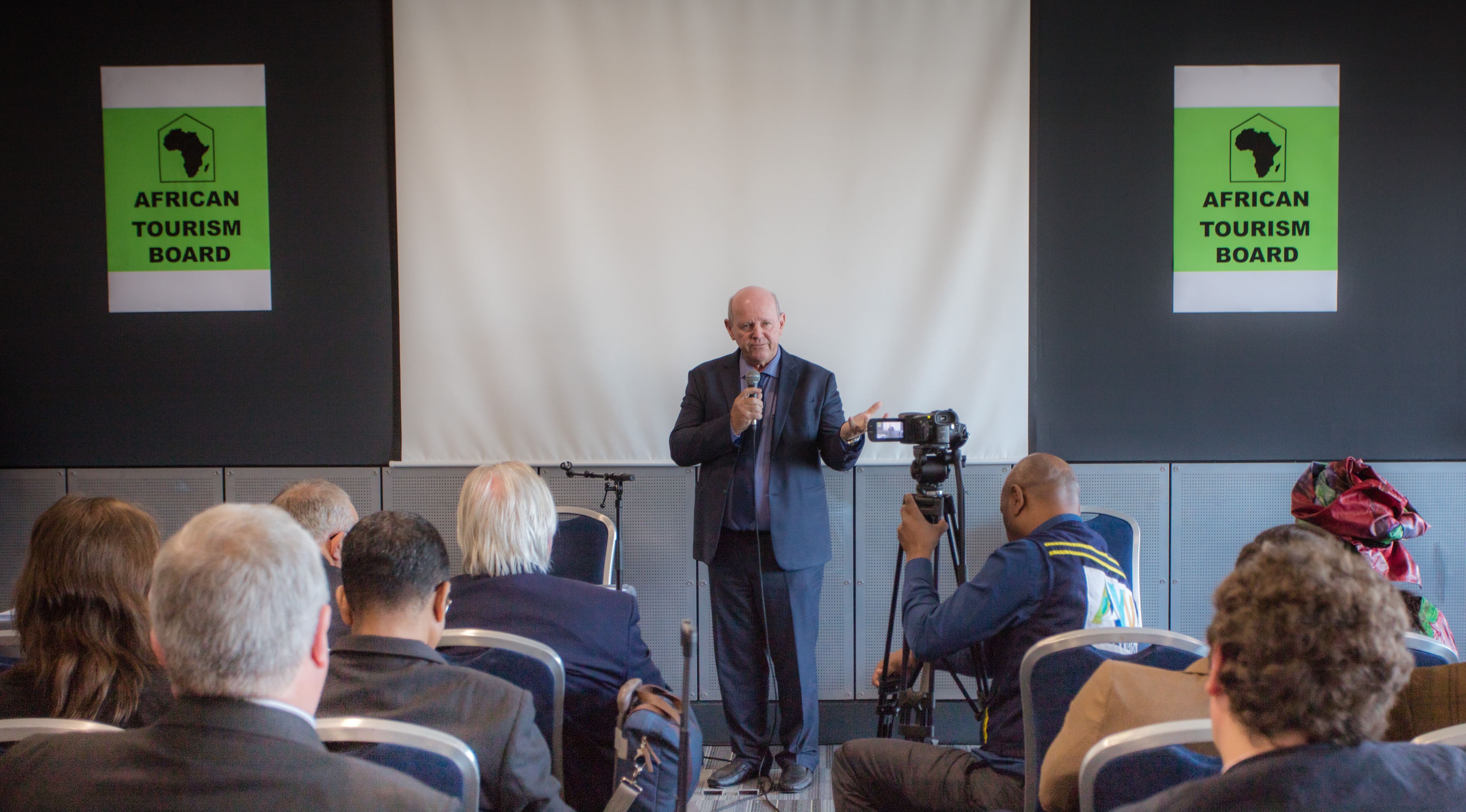
Africa now has an African Tourism Board
On Monday at the World Travel Market in London, Africa was in the spotlight in the afternoon with the launch of the newly-formed African Tourism Board. A new, multinational body to promote the travel and tourism sector in Africa was unveiled during World Travel Market in London.
Created by the International Coalition of Tourism Partners, itself based in Seychelles, Brussels, Bali, and Hawaii, the Africa Tourism Board will seek to enhance and promote the sustainable growth, value, and quality of travel on the African continent.
The star guest was none other than former UNWTO Secretary-General Taleb Rifai, who welcomed the newly-founded tourism board and shared memories and success stories as well as the importance for African Tourism.
The Hon. Tourism Minister Anil Kumrsingh Gayan from Mauritius reminded attending tourism leaders about challenges in Africa touching connectivity.
The Hon. Minister Madam Memunatu B. Pratt, Minister of Tourism for Sierra Leone, shared her vision for African tourism and outlined challenges and welcomed the African Tourism Board.
Alain St. Ange, former Minister of Tourism for Seychelles, asked Africa to rally behind this initiative.
Carol Weaving, Managing Director of Reed Exhibitions, voiced her support as a board member and assured a great official launch event during WTM Capetown from April 10-12, 2019.
Professor Geoffrey Lipman launched a new initiative enabling thousands of young people to get a scholarship. “We want these young bright African people to get an education in tourism in Africa and not in the U.S. or Europe,” he said.
Graham Cooke, Founder of the World Travel Awards, announced a partnership and his support. Tony Smyth from IFree Group Hong Kong echoed the support of this global communications company.
Louis D’Amore, Founder of the International Institute for Peace Through Tourism sent his greeting and his hope to have his next conference in Africa.
The ICTP Chairman and initiator of the African Tourism Board said:
I am humbled and overwhelmed today seeing so many of you have taken the time to be here today. May I first thank Carol Weaving, Director of Reed Exhibitions for hosting this event today.
This is the first informal meeting and the soft launch of the African Tourism Board before our official launch planned at WTM Capetown from April 10-12, 2019.
The presence of so many of you, the honor to see so many ministers and leaders from throughout Africa, demonstrates great encouragement.
Africa needs its own voice in the global travel and tourism industry. With 54 countries, many more cultures, and a wealth of attractions, it’s still a continent to be discovered.
Tourism also means responsibilities, and tourism means business, investments, and should mean prosperity.
And this is where the African Tourism Board can be of great help.
The African Tourism Board is about business, but it’s also about responsible and sustainable tourism and is about investments, and it’s a source in crisis situations, and it’s all about bringing African tourism together.
Africa is a competitive place, and our partner, the World Travel Awards, recognizes the best of the best every year, and I am glad Graham Cooke is here today able to tell you more.
ICTP is a global organization. Our theme is “Green Growth and Quality equals Business. ” Our organization in its current form was founded in Lusaka, Zambia, during the International Institute for Peace through Tourism Conference in 2011. This was jointly witnessed by IIPT Founder ,Louis D’Amore; Alain St. Ange, Minister of Tourism at that time from Seychelles; Geoffrey Lipman, President of ICTP from Brussels; Eddy Bergman from the African Travel Association in New York; and myself. This happened also in the presence of the Zambia Tourism Minister, Catherine Namugala, and Dr. Walter Mzembi, Tourism Minister of Zimbabwe at that time.
With so many ties to Africa, with Rwanda, Johannesburg, Nigeria, Seychelles, and Reunion as African founding members, ICTP is now the driving force behind the African Tourism Board today.
With our steering committee formed, the African Tourism Board goal is to convert this initiative into a stand-alone organization by April 2019.
Our vision is to have ATB be based in every member destination and in every source market. This will create a global network for Africa, and enables every base to interact with every other base.
ATB has no intention to take over your national tourism initiatives, tourism boards, or policies. See us as a consultant, see us as a client ready to bring business.
ATB cannot be just an organization of dedicated volunteers, we plan to build an organization of paid professionals.
We don’t plan to compete with any other member organization, they have worked hard for Africa. We’re ready to lend our hand.
What we bring to the table are projects you can buy into and that are generated with your interest in mind. This is where our strength will be.
We are not here to take your money and organize costly events, or send you on roadshows that are never meant to bring the return you are looking for.
We are not here to replace your current effort to promote your destination, replace your PR or Marketing representatives; we’re here as your consultant, advisor, spokesperson, and we will have a hands-on approach.
We are not here to charge you membership fees, we are here to build a global network with you and for you, and it’s up to you to buy into the projects we bring to the table. We are building a partnership for African Tourism – anywhere in the world.
For example, what works in Germany, doesn’t work in the United States, in China, or in India. Case in point, for the U.S. market, having another dinner or cocktail evening in New York may bring the same non-producing and often so-called travel professionals together for a fun evening, but it won’t generate business.
Paying someone to write a costly press release will not generate publicity or create long-lasting exposure. We know this, and your PR and marketing agency knows it. We like to work with those who know this and are willing work and bring a different approach to the table.
What about secondary markets in the U.S.? We plan to hire a professional rep making sales calls who will visit travel companies and concentrate on often overlooked but highly-potential markets in the U.S.
We’re here to introduce specialty markets like the MICE industry.
Americans love the Internet, but they still love to talk to someone even more. We will establish an African Call Center to respond to questions, respond to emails, and respond to social media comments. The U.S. is only one market. In this room alone, you can see experts ready to bring travelers from potential markets like India, Germany, the UK, and China to your destination.
Therefore, we are building a global network of media friends and Africa-friendly trade. We work with the organization “Tourism and More” on training for tourism police, on safety certification, and workshops. We are planning to work with the International Tourism Investment Conference in attracting investments to Africa.
We already started to identify an excellent team of a board and steering committee members. Our steering committee is ready to establish a way forward and will help with a structural set-up to announce in April at our official launch.
People asked me where ATB will be based.
We would like to have ATB based in every country that supports us – this includes African countries and in countries with a source market for African Tourism. We need a go-to person on the ground in every country, and we need to find a way to communicate with every person on the ground in other countries and regions within and outside Africa.
We won’t charge memberships, but we rely on sponsorships based on your ability, and in addition, we will offer a catalog of projects you can buy into.
www.africantourismboard.com is an easy domain to be branded, and its one of the reasons we decided to call this initiative the African Tourism Board.
We invite our stakeholders to have an email address or website on our platform. This will raise confidence among consumers and provide a chance for small to medium businesses in Africa to do business in source markets.
After the Monday event, ATB received emails and calls from all across Africa, and it appears many more destinations in Africa want to join the African Tourism Board.
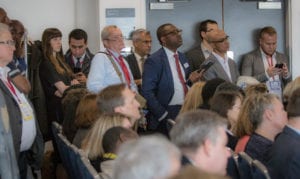
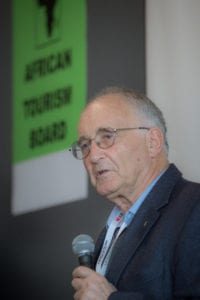
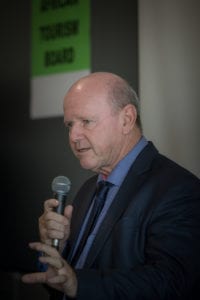
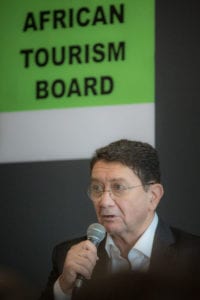

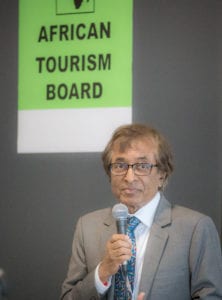
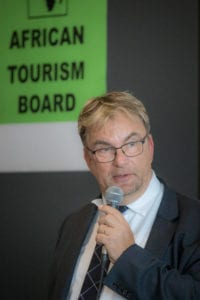
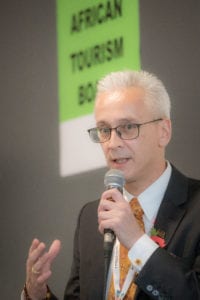
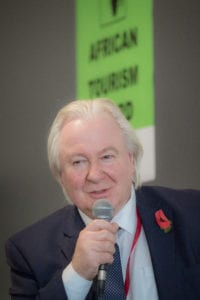
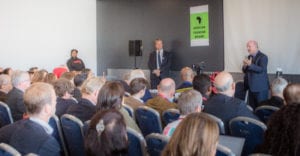
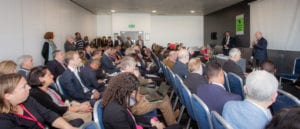
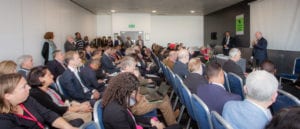

Governments and Investors Share Knowledge on Tourism Technology at UNWTO/WTM Ministers’ Summit
The UNWTO/WTM Ministers’ Summit, held yesterday by World Travel Market and the World Tourism Organization (UNWTO), was well received by participants from government and the private sector for its more dynamic new format leading to more concrete takeaways around this year’s theme: Investment in Tourism Technology.
This year, the UNWTO/WTM Ministers’ Summit held at World Travel Market, one of the world’s biggest tourism trade show (6 November 2018), focused on investment in tourism technology with a novel format. For the first time the summit featured a panel of private sector leaders alongside a panel of ministers, sparking an open and useful exchange of ideas and opinions on how to channel private capital into innovative tourism technologies.
This meant that tourism ministers and high-level representatives from countries including Bahrain, Bulgaria, Egypt, Italy, Malaysia, Mexico, Portugal, Romania, South Africa, Uganda, Uruguay and the UK were able to directly reflect on and respond to the opinions voiced by the leading tourism and technology investment funds involved in the panel, such as Alibaba Capital Partners, Atomico and Vynn Capital.
“Without the support of the key tourism stakeholders, notably governments, corporations and investors, development and implementation of innovative products is not possible. Today’s discussions shed light on the influential role of both sectors as well as the need for stronger public-private partnerships”, said UNWTO Deputy Secretary-General Jaime Cabal opening the event.
A common sentiment amongst the panel of private sector entrepreneurs was that disruption leads change in the tourism sector, but regulation can be preventative to obtaining the attractive investment conditions needed to support disruptive new business ventures. It was suggested that regulation should be fixed in order to give clear guidelines to investors who wish to put private capital into new technology.
Several technology investors highlighted the need to narrow the opportunity cost and clear up the governance barriers for innovation in tourism. “It needs to be easy for start-ups to grow and expand – if rules change too quickly, investors will hesitate to invest,” Katherine Grass of Thayer Ventures told ministers.
Lio Chen, Managing Director at the Travel & Hospitality Center of Innovation at venture capital firm Plug and Play, called for larger technology companies to engage with start-ups to boost ideas, human resources and investment. “I ask ministers to incentivize the top five corporations in their country to work with start-ups and foster innovation,” he said.
On the subject of regulation, Michael Ellis, UK Parliamentary Under-Secretary of State for Arts, Heritage and Tourism, said: “It’s a question of balance, and it’s a challenge to get that right, especially in technology.” He also urged ministers to boost sustainability and help tackle the world’s climate-related problems, such as rising carbon emissions.
Education was also highlighted as an element making investments more attractive. “Education allows technology to root into societies and contribute to making tourism more inclusive for communities,” said Benjamin Liberoff, Vice-Minister of Tourism of Uruguay.
“We have brought the public and private sector together in a unique format, and hope it will deliver real change in the sector. As tourism grows, then technology will play a key role,” said Simon Press, Senior Exhibitions Director of WTM London.
Moderated by Richard Quest of CNN International, the summit contributed to UNWTO’s ongoing priority to place tourism at the centre of the global innovation agenda.
